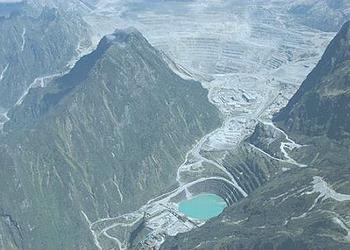
By Jenny Denton
MELBOURNE, Australia, October 18, 2013 (ENS) – Swedish pension fund authorities have followed the lead of counterparts in Norway and New Zealand in divesting all holdings in the American company Freeport McMoRan, which operates the world’s biggest copper and gold mine in the contested province of Papua, in Indonesia.
Following the recommendation of their ethical advisory council, Sweden’s state-owned pension “buffer funds” AP1 to AP4 elected to exclude shares of the Phoenix, Arizona-based company from their investment portfolios on environmental grounds.

In a statement the Ethical Council said Freeport was “linked to serious adverse environmental impacts that contravene the UN Convention on Biological Diversity” through its mining operations in Papua.
“Freeport’s Grasberg mine in Indonesia is located in an area of high biological diversity and is adjacent to Lorentz National Park, a UNESCO world heritage site. The Grasberg mine releases large quantities of mining waste into a nearby river,” the statement said.
The Grasberg mine is located in the remote highlands on the western half of the island of New Guinea. Mining operations began in 1973 and are expected to continue until 2041.
PT Freeport Indonesia disposes of tailings from its “Grasberg minerals district” high up in Papua’s central mountain range directly into a natural river system.
Hundreds of thousands of tonnes of processed ore are dumped every day into the Aghawagon River, and make their way down a steep valley into a “sacrifice zone” in the coastal lowlands.
Environmental groups claim the waste – which is visible from space – contains unacceptably high levels of copper, mercury, arsenic and cadmium and has smothered and poisoned the rivers and surrounding forest.
Indigenous inhabitants of the area have long complained about impacts on their health and livelihood.
According to the “New York Times,” a report prepared for Freeport by American consultants in 2002 noted that the rivers and wetlands affected by the waste were “unsuitable for aquatic life.”
Freeport McMoRan says its “riverine tailings disposal” system was decided on after intensive assessment and review processes and is approved by the government of Indonesia.
“More conventional management systems were rejected due to the extreme terrain in a seismically active area with high precipitation, which created unacceptably high risks of catastrophic failure,” the company states on its website.

In detailing the funds’ decision the Swedish Ethical Council said attempts to influence the behavior of the company through engagement had failed and further dialogue was “likely to be ineffectual” as Freeport’s CEO and chairman had “reserved the right to release waste into rivers” on both current and future projects.
In 2006 the Norwegian Ministry of Finance made a similar decision in relation to its global pension fund, citing “an unacceptable risk of complicity in severe and irreversible damage to the natural environment” in relation to the Grasberg mine.
The Norwegian fund took the further step of divesting holdings in the British-Australian metals and mining corporation Rio Tinto, which has a significant stake in Freeport McMoRan’s Papuan mining operations, worth US$816 million, at today’s rates.
In September last year New Zealand’s Superannuation Fund announced it would exclude Freeport McMoRan from its investment portfolio on human rights grounds.
“Freeport McMoRan has been excluded based on breaches of human rights standards by security forces around the Grasberg mine, and concerns over requirements for direct payments to government security forces by the company in at least two countries in which it operates,” said the New Zealand Superannuation Fund statement.
“Despite improvements in Freeport McMoRan’s own human rights policies, breaches of standards by government security forces are beyond the company’s control. This limits the effectiveness of further engagement with the company,” said the New Zealand Superannuation Fund.
The Freeport mine is a highly controversial presence in the Papuan provinces. Through its security arrangements with the Indonesian military the mine has been linked to severe human rights abuses, including 160 documented killings of indigenous Papuans in its project concession area over a 45-year period.
In May this year 28 workers were killed in a tunnel collapse at the mine.
Antioch University New England human rights researcher Abigail Abrash said, “As evidenced by this decision, Freeport’s top management continues to rebuff the long-standing concerns of institutional investors, including the New York City Employees’ Retirement System and others. What will it take to change this company’s egregious practices?”
In its 2012 annual report Freeport McMoRan reported sales of over US$2.5 billion of copper and US$1.5 billion in gold from its Indonesian operations.
Copyright Environment News Service (ENS) 2013. All rights reserved.
© 2013, Environment News Service. All rights reserved. Content may be quoted only with proper attribution and a direct link to the original article. Full reproduction is prohibited.
